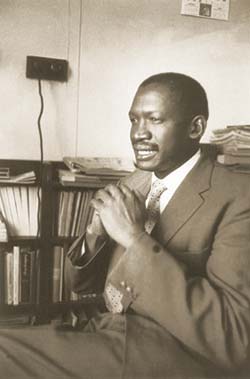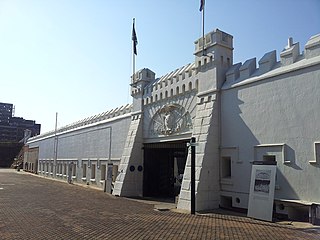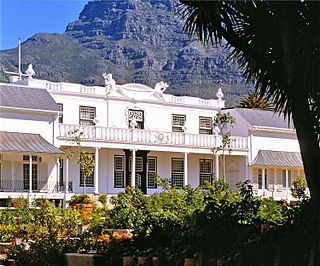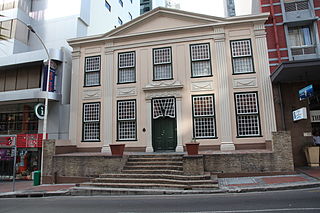
Robben Island is an island in Table Bay, 6.9 kilometres (4.3 mi) west of the coast of Bloubergstrand, north of Cape Town, South Africa. It takes its name from the Dutch word for seals (robben), hence the Dutch/Afrikaans name Robbeneiland, which translates to Seal(s) Island.

A penal colony or exile colony is a settlement used to exile prisoners and separate them from the general population by placing them in a remote location, often an island or distant colonial territory. Although the term can be used to refer to a correctional facility located in a remote location, it is more commonly used to refer to communities of prisoners overseen by wardens or governors having absolute authority.

Table Bay is a natural bay on the Atlantic Ocean overlooked by Cape Town and is at the northern end of the Cape Peninsula, which stretches south to the Cape of Good Hope. It was named because it is dominated by the flat-topped Table Mountain.

Robert Mangaliso Sobukwe OMSG was a South African anti-apartheid revolutionary and founding member of the Pan Africanist Congress (PAC), serving as the first president of the organization.

Cape Malays also known as Cape Muslims or Malays, are a Muslim community or ethnic group in South Africa. They are the descendants of enslaved and free Muslims from different parts of the world, specifically Indonesia and other Asian countries, who lived at the Cape during Dutch and British rule.

Ahmed Mohamed Kathrada OMSG, sometimes known by the nickname "Kathy", was a South African politician and anti-apartheid activist.

The Georgics is a poem by Latin poet Virgil, likely published in 29 BCE. As the name suggests the subject of the poem is agriculture; but far from being an example of peaceful rural poetry, it is a work characterized by tensions in both theme and purpose.

The Constitution Hill precinct is located at 11 Kotze Street in Braamfontein, Johannesburg near the western end of the suburb of Hillbrow. Constitution Hill is the seat of the Constitutional Court of South Africa.

Tokai, a large residential suburb of Cape Town, South Africa, is situated on the foothills of the Constantiaberg, and is bordered by Steenberg and Kirstenhof to the south, Bergvliet to the east, Constantia to the north and the SAFCOL pine tree plantations against the mountain to the west.

De Tuynhuys is the office of the president of South Africa, located in Cape Town.

Goodbye Bafana, or The Color of Freedom (US), is a 2007 drama film, directed by Bille August, about the relationship between Nelson Mandela and James Gregory, his censor officer and prison guard, based on Gregory's book Goodbye Bafana: Nelson Mandela, My Prisoner, My Friend. The film also explores the relationship of James Gregory and his wife as their life changes while Mandela is under Gregory's watch.
James Gregory was the censor officer and prison guard of Nelson Mandela for many years of his captivity. He later wrote the book Goodbye Bafana: Nelson Mandela, My Prisoner, My Friend, on which the 2007 film Goodbye Bafana was based. The book, and later the film, are based on the idea that Gregory and Mandela had developed a friendship despite being prison guard and prisoner, respectively.
Makana Football Association was a sporting body formed by political prisoners on Robben Island, South Africa who organised football leagues for fellow inmates. Formed in 1966, the association ran a league until 1973, adhering strictly to the Laws of the Game, the FIFA rulebook being one of the few books in the prison library. It was named after the 19th century Xhosa warrior-prophet Makana, who was himself imprisoned on Robben Island.
Oude Ram Afrikaner was the leader of a clan that later became known as the Orlam Afrikaners, a sub-group of the Orlam. The clan consisted of mixed-race descendants from indigenous Khoikhoi and slaves from Madagascar, India, and Indonesia. Members of this mixed race are today sometimes called African Creole people or Creole Africans, as well as Coloureds.
Dozens of fortifications were built in Cape Town and the Cape Peninsula between the 1650s and the 1940s. Most have gone, but a few still stand.

Fort Saint Anthony was a fort built by the Portuguese in 1515 near the town of Axim, in what is now Ghana. In 1642, the Dutch captured the fort and subsequently made it part of the Dutch Gold Coast. The Dutch expanded the fort considerably before they turned it over, with the rest of their colony, to the British in 1872. The fort is now the property of the Ghanaian state and is open to the public.

Koopmans-de Wet House is a former residence and current museum in Strand Street, Cape Town, South Africa. The house became part of the South African Museum in 1913 and was opened to the public on 10 March 1914. It was declared a National Monument under National Monuments Council legislation on 1 November 1940. It is the oldest house museum in South Africa.

David Stuurman was a Khoi chief and political activist who fought against Dutch and British colonial administration. His active career as Khoi leader spanned twenty years (1799-1819) and the three Xhosa Wars which fell within this period.
Neil Joseph William Sandilands is a South African actor and filmmaker, known for roles in both film and television and for his versatility in filmmaking. In 2016, he had recurring roles on Sundance TV's Hap and Leonard as Paco and The CW's The 100 as Titus. In 2017, he joined the main cast of The CW series The Flash, playing Clifford DeVoe / The Thinker. He also played General Abbott in the Netflix series Sweet Tooth, for which he received a Children's and Family Emmy Award for Outstanding Supporting Performance nomination.

The Robben Island Lighthouse is a lighthouse on Robben Island in Table Bay near Cape Town.















